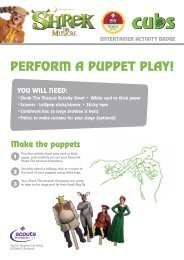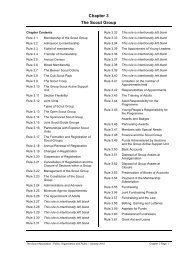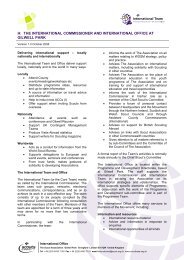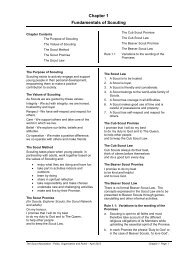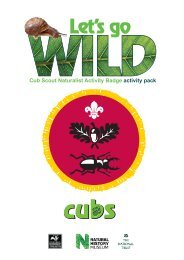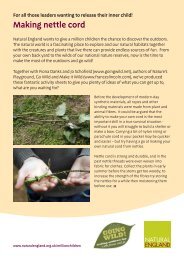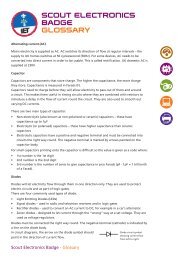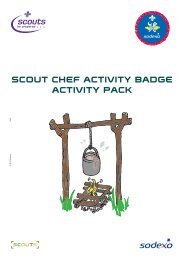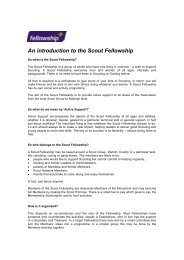Games for Beaver Scouts - Tynemouth District Scouts
Games for Beaver Scouts - Tynemouth District Scouts
Games for Beaver Scouts - Tynemouth District Scouts
You also want an ePaper? Increase the reach of your titles
YUMPU automatically turns print PDFs into web optimized ePapers that Google loves.
<strong>Games</strong> <strong>for</strong> <strong>Beaver</strong> <strong>Scouts</strong><br />
S<br />
Item Code FS1550013 12 th October 2004 Edition no 1 0845 300 1818<br />
<strong>Games</strong> are essential <strong>for</strong> the full development of<br />
children and the creation of fun through games is<br />
necessary <strong>for</strong> their growth and happiness. This<br />
factsheet is sponsored by Bank of Scotland.<br />
There are so many things children can learn about<br />
themselves and their playmates while enjoying<br />
themselves and learning to interact with others in<br />
a meaningful way. <strong>Beaver</strong> <strong>Scouts</strong> having a tug of<br />
war must co-operate with each other to play the<br />
game. Co-operation leads to the improvement of<br />
the group as a whole. The important fact is that<br />
the <strong>Beaver</strong> Scout has learnt to co-operate while<br />
having fun.<br />
Individually <strong>Beaver</strong> <strong>Scouts</strong> can understand their<br />
own capabilities through individual competition.<br />
<strong>Beaver</strong> <strong>Scouts</strong> should participate in a game <strong>for</strong><br />
the fun and the experience of playing, not just <strong>for</strong><br />
the sake of winning. They can develop a sense of<br />
fair play and be reconciled to the fact that they<br />
cannot always win. This is a tough lesson <strong>for</strong> this<br />
age group to accept and has to be learned<br />
gradually. The outcome of games is less<br />
significant than the fact that a child has<br />
participated to the fullest and enjoyed it. If these<br />
aspects can be stressed to the <strong>Beaver</strong> <strong>Scouts</strong>,<br />
they will gain more from the games they play and<br />
not just be caught up in inter-personal<br />
competitiveness.<br />
Keeping control<br />
It is important that all games are played with good<br />
order and discipline. Some ways of keeping<br />
control of the various types of games and<br />
ensuring they are fun <strong>for</strong> all concerned are:<br />
<br />
Have all the necessary equipment ready<br />
be<strong>for</strong>e the game starts.<br />
<br />
<br />
<br />
<br />
<br />
<br />
<br />
<br />
<br />
<br />
Have the <strong>Beaver</strong> <strong>Scouts</strong> sitting down whilst<br />
you explain the game. They fidget less that<br />
way and you have more command of the<br />
situation. Have complete silence be<strong>for</strong>e you<br />
start to explain.<br />
Choose games with simple rules. Make sure<br />
that the <strong>Beaver</strong> <strong>Scouts</strong> understand them<br />
be<strong>for</strong>e you begin. Have a trial run if it will<br />
help you to make sure that everyone knows<br />
what to do. Be quite certain you know how to<br />
play the game yourself!<br />
Knockout games are undesirable if they<br />
leave children idle on the sidelines where<br />
they are sure to start up a rival game of their<br />
own. Arrange that they shall only lose a life<br />
and return to the game.<br />
If the game goes wrong, stop it immediately<br />
and explain the rules again. Be firm about<br />
keeping the rules.<br />
<strong>Beaver</strong> <strong>Scouts</strong> should learn that fair play and<br />
good sportsmanship bring rewards.<br />
Introduce new games gradually; lots of new<br />
games all at once can be confusing.<br />
Do not play the same few 'favourite' games<br />
too often.<br />
Be aware of the capabilities of the <strong>Beaver</strong><br />
<strong>Scouts</strong>; ensure challenge as well as fun.<br />
Praise and encourage the <strong>Beaver</strong> <strong>Scouts</strong><br />
when they have tried very hard.<br />
Beware of adults joining in the games as this<br />
can overexcite the Colony.<br />
The Scout In<strong>for</strong>mation Centre<br />
Gilwell Park Ching<strong>for</strong>d London E4 7QW Tel + 44 (0)20 8433 7100 Fax + 44 (0)20 8433 7103 email info.centre@scout.org.uk www.scoutbase.org.uk
page 2 of 3<br />
<br />
Types of games<br />
Playing games is an ideal way to give the <strong>Beaver</strong><br />
<strong>Scouts</strong> experience of working in different sizes of<br />
groupings. Some games focus on the individual,<br />
others require pairs to work together, others are<br />
organised with the Colony divided in half, some<br />
promote team work while others are enjoyed as a<br />
whole Colony. Some promote competition<br />
between individuals or teams; others rely on the<br />
<strong>Beaver</strong> <strong>Scouts</strong> co-operating together to succeed.<br />
A good <strong>Beaver</strong> Scout Colony will offer over the<br />
three to four month planning period, a wide range<br />
of games, run in a variety of ways and balancing<br />
competitive and non-competitive games.<br />
Here are a few examples of different types of<br />
games.<br />
Energetic games<br />
This type of game can help a Colony release<br />
energy; something all <strong>Beaver</strong> <strong>Scouts</strong> have in<br />
great abundance.<br />
Relay games can be adapted to suit any theme,<br />
(assault courses, dressing up, carrying objects,<br />
hopping), and are easy to organise.<br />
Snowball fight. The Colony <strong>for</strong>ms up on the<br />
banks of the river, defined by two ropes or<br />
chalked lines. Both groups are equipped with a<br />
supply of stocking balls or newspaper balls and at<br />
the appropriate signal, throw the 'snowballs' at<br />
each other. Any snowballs that fall in the river are<br />
deemed to have melted and cannot be used.<br />
Link-up tag. When a <strong>Beaver</strong> Scout touches or<br />
catches another, the second <strong>Beaver</strong> Scout is<br />
captured and they join hands and chase the<br />
remainder. As each new captive joins, the chain<br />
gets longer.<br />
Quiet games<br />
This type of game can calm the Colony and be an<br />
opportunity <strong>for</strong> the less agile to do well.<br />
Leader of the band. <strong>Beaver</strong> <strong>Scouts</strong> sit in a<br />
circle, an object is passed round (a stick, cloth or<br />
piece of rope). When the whistle is blown or the<br />
music stops, the <strong>Beaver</strong> Scout with the object has<br />
to mime an action using the object. The rest of<br />
the Colony has to guess the action e.g. a paper<br />
plate as steering wheel, flying saucer, clock,<br />
mirror, etc.<br />
<strong>Games</strong> of skill<br />
This category can be split into two: physical skills<br />
and sense training skills.<br />
Team games involving throwing stocking balls<br />
into buckets or boxes from a distance. Dress up a<br />
receptacle as a clown's mouth or attach a small<br />
bell which should be hit be<strong>for</strong>e the ball goes in.<br />
Crab football. This is the same as ordinary<br />
football, except the <strong>Beaver</strong> <strong>Scouts</strong> move around<br />
with their bottoms and their hands on the floor.<br />
What's that? The <strong>Beaver</strong> <strong>Scouts</strong> listen to<br />
household sounds taped on a recorder. How<br />
many can they identify?<br />
What's in the bag? Everyone in the team can<br />
feel the bag together. As soon as they recognise<br />
an object by feel, they run up and tell the Leader<br />
who marks it off a list. The first group to guess all<br />
the objects is the winner. This game could have a<br />
seasonal touch by using objects <strong>Beaver</strong> <strong>Scouts</strong><br />
would possibly find on festive occasions.<br />
Outdoor games<br />
Most indoor active games can be played out of<br />
doors, taking advantage of a larger playing area.<br />
It also gives the opportunity <strong>for</strong> collection games,<br />
e.g. collect six objects that are coloured red,<br />
different leaves, grasses, stones; the large scale<br />
ball games or chase games; and <strong>for</strong> treasure<br />
hunts and trails.<br />
Colony games book<br />
Leaders should endeavour to build up their own<br />
book of games, which are popular with their own<br />
<strong>Beaver</strong> <strong>Scouts</strong>. The book should be divided up<br />
with sections <strong>for</strong> easy reference. It could be<br />
divided by grouping i.e. individual games, 2-team<br />
games, relay games, circle games, Colony<br />
games. Or by purpose; coming-in-games, quiet<br />
games, energetic games, outdoor games, sense<br />
training games etc.<br />
New games can be obtained from a variety of<br />
sources including books, both Scouting and<br />
general, other <strong>Beaver</strong> Scout Leaders, Leaders<br />
from other Sections, your own experience as a
page 3 of 3<br />
child or from your own children, and from the<br />
<strong>Beaver</strong> <strong>Scouts</strong> themselves.<br />
<strong>Games</strong> equipment<br />
The <strong>Beaver</strong> Scout Colony will play a whole host of<br />
games using a wide variety of equipment. A<br />
games box or cupboard is an essential part of the<br />
Colony's resources.<br />
The following items will prove useful in lots of<br />
different games:<br />
large and small balls - foam, rubber, tennis,<br />
football, ping-pong; lightweight bats; newspaper<br />
balls; unihock or old hockey sticks; bean bags;<br />
hoops; skittles and plastic bottles; marker cones;<br />
blindfolds; big dice; ropes - long and short; tiles<br />
and carpet squares; sacks; old sheets; parachute<br />
or play canopy; counters; whistle; chalk and<br />
board; coloured tape - <strong>for</strong> marking the floor.<br />
Some games <strong>for</strong> your Colony<br />
Shapes Articles are placed in a bag and the<br />
<strong>Beaver</strong> <strong>Scouts</strong> have to try to guess the contents.<br />
Fishes In the net Two <strong>Beaver</strong> <strong>Scouts</strong> in the<br />
centre of the room hold hands. Arrange the rest<br />
of the Colony in two teams against the walls at<br />
each end. The <strong>Beaver</strong> <strong>Scouts</strong> run from one end<br />
to the other without being caught in the net. If<br />
caught they join the end of the net.<br />
Find your partner Cut out small cards with<br />
names on them, e.g. 'fish' and 'chips'; 'horse' and<br />
'cart'; 'bat' and 'ball'. The <strong>Beaver</strong> <strong>Scouts</strong> pick up a<br />
card and find their partners by shouting out the<br />
word on their own card. They make a line with<br />
their partners down the centre of the room. This<br />
can be repeated as required.<br />
Word game (<strong>Beaver</strong> <strong>Scouts</strong>, Colony, Lodges,<br />
etc.) Cut approximately 24 spills or coloured<br />
straws to different lengths. The <strong>Beaver</strong> <strong>Scouts</strong> in<br />
relay, run to a given base and make up the word<br />
by placing a long or short spill over the<br />
appropriate letters which are written on large<br />
cards.<br />
Pea walks The <strong>Beaver</strong> <strong>Scouts</strong> in relay team,<br />
transfer peas from one source to another by<br />
sucking up a straw.<br />
Guard the chair Some <strong>Beaver</strong> <strong>Scouts</strong> guard the<br />
chair while the rest of the Colony try to hit it with a<br />
soft ball. Time this, and then change the <strong>Beaver</strong><br />
<strong>Scouts</strong> to see who lets through the most hits.<br />
Fishing A magnet is attached to a string. The<br />
<strong>Beaver</strong> <strong>Scouts</strong> try to catch a cardboard fish with a<br />
paperclip attached. The team with the fastest<br />
catch wins.<br />
Clock time Large cardboard clocks are placed in<br />
the centre of the room with moveable fingers. The<br />
<strong>Beaver</strong> <strong>Scouts</strong> are in a circle and numbered off 1,<br />
2, 3 and so on. A number is called together with a<br />
time. The <strong>Beaver</strong> <strong>Scouts</strong> run up and alter the<br />
fingers to the correct time.<br />
Mini-obstacle course Place obstacles round the<br />
room. The <strong>Beaver</strong> <strong>Scouts</strong>, in teams, are timed<br />
around the course.<br />
Centipedes In relay team <strong>for</strong>mation, each <strong>Beaver</strong><br />
Scout bends down and holds on to the ankles of<br />
the <strong>Beaver</strong> Scout in front. They race to the other<br />
end of the room.<br />
The Scout Association MasterCard, in association<br />
with Bank of Scotland, is an ideal way to show<br />
your support <strong>for</strong> Scouting and has so far raised<br />
over £400,000 <strong>for</strong> our work.<br />
When you first use your new Scout Association<br />
MasterCard, Bank of Scotland will make a £4.50<br />
donation to us and a further £2.50 if you are still<br />
using your card after 8 & 20 months. As well as<br />
this, <strong>for</strong> every £100 you spend on your Scout<br />
Association card, we receive 25p.<br />
The Bank has recently announced a special<br />
introductory rate of 0% p.a. <strong>for</strong> the first nine<br />
months when you make a purchase or move a<br />
balance from another card onto this one. After that<br />
time the typical APR is 15.9% (variable) <strong>for</strong><br />
balance transfers and purchases.<br />
If you apply by ringing 0800 731 2239 or on-line at<br />
www.scouts.org.uk the Bank of Scotland will<br />
donate up to an additional £35<br />
to The Scout Association.



